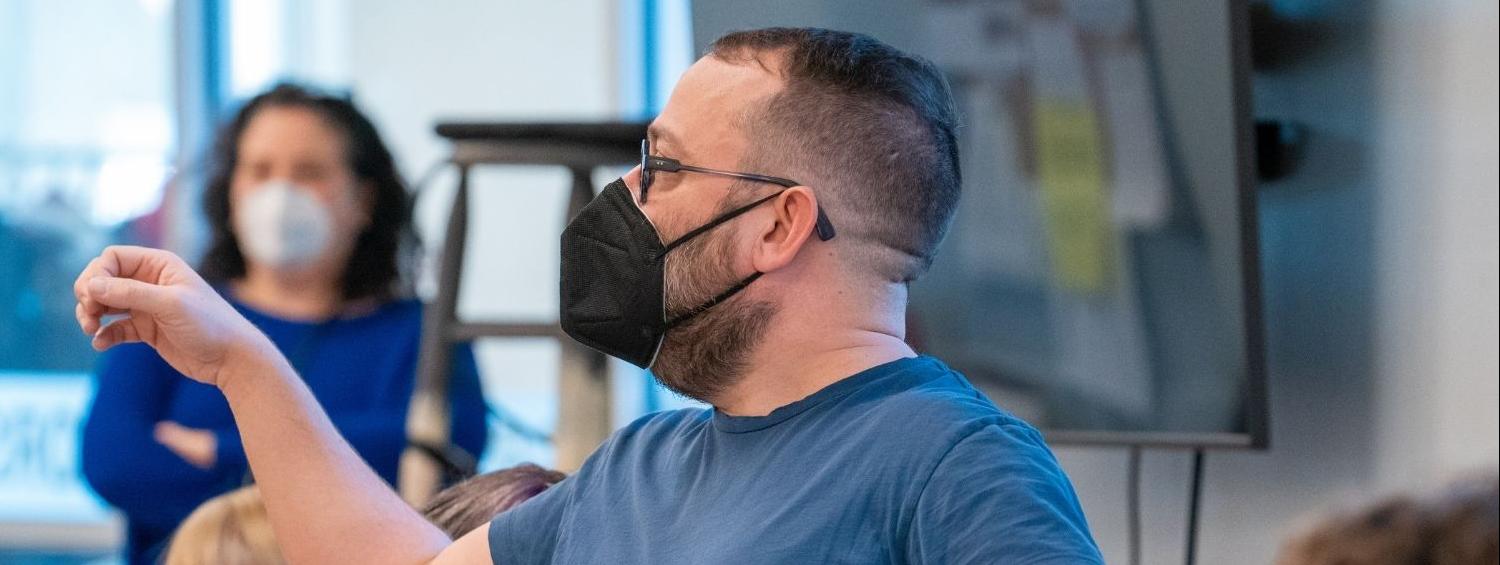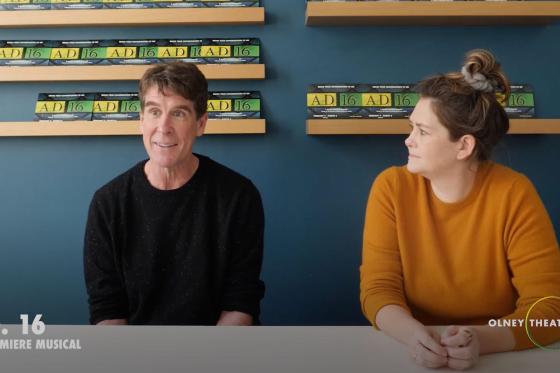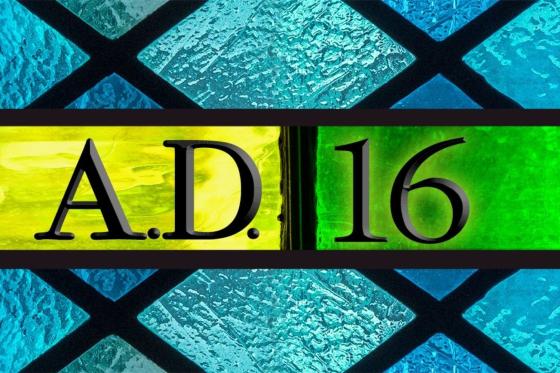Production Dramaturg, Alissa Klusky, sat down with Director Stephen Brackett to chat about his work shepherding new musicals, his directing perspective, and his thoughts about the world premiere of A.D. 16 at Olney Theatre Center. Read their conversation below!
Alissa Klusky: Hi Stephen! Thank you so much for sitting down with me today to talk about your incredible directing portfolio and our upcoming world-premiere production of A.D. 16.
Stephen Brackett: Awesome, let’s do it.
AK: Your directing catalog demonstrates a passion for nurturing new musicals. You’ve worked on projects like a musical adaptation of Rick Riordan’s The Lightning Thief, Broadway’s Be More Chill, and Broadway-bound, Pulitzer prize winning A Strange Loop. What initially drew you to working with brand new musicals?
SB: Well when I was going to school New Works weren’t really in my eye-line at that moment, I was doing these kinds of very angsty German classics. And when I graduated, it became really clear to me that the most exciting work that I was seeing, for me personally, was new work. And so I got kind of pulled into that new work world primarily in new play development. What I love most about developing new work is the collaboration with the writers. I love working in the theater because you get to work with so many amazing artists and I feel like the director's job is to make sure that everybody's working towards a singular vision. And so with working on new plays, I very quickly was like, wait, “I would love to be working on new musicals as well.” I started directing readings and kind of figuring out what that was. And what I love about developing new musicals is that not only do you have the collaboration with the writers, but then you start to have the collaboration with the choreographer and the music director. The ship gets bigger and bigger and bigger, even if it's a really intimate, tiny little musical. So I really kind of discovered a passion there and a love of storytelling that incorporates music and incorporates musicality. So much of your kind of senses vibrate with music. And it felt like there was something that just kind of clicked within me that I was like: “Oh, I love this.” So now, most of my work is developing new musicals.
AK: I know your most recent project, A Strange Loop, is headed to Broadway after a brief hiatus from the stage after the 2019 Playwright’s Horizons production. What was it like to remount this show at Woolly Mammoth here in DC? Did you and writer Michael Jackson ever picture the show going to Broadway?
SB: I mean, listen, before the New York run, we had seven years of development with that show. For a long time we felt like it was too dangerous of a show that nobody would even produce it. So, we didn't even dare dream of Broadway for it. We dreamt of a production somewhere in a basement probably. And so I think he and I were just so thrilled that I had a life at Playwrights Horizons,, and then such beautiful accolades were given to not only the show, but to Michael specifically. I feel like it was with that response that we sort of let ourselves imagine that this might have a potentially bigger future ahead of it. Nothing is ever a given. And so we would sort of fantasize about it a little bit, but not want to indulge too much, because you don't want to set yourself up for a heartbreak.
Actually, the pandemic was a really interesting element of developing that show. I think the whole world went crazy during the pandemic. And we all took a hiatus from making theater for live audiences. So, it feels like we're in a different world now and the world hears that show differently now. Going into DC, we were wondering how that was gonna feel, how this story of this Usher was going to kind of resonate in this new landscape that feels different now, but also fundamentally the same. And that excites us! It was a great blessing for us to have a new lead in that show for DC because it really asked us to reinvestigate that show and certainly the physical production. The production itself doesn't differ a lot from what we did in New York, but for me having a new lead to kind of filter us through the show, opened up so many things for me to reinvestigate that it felt like a new production to me.
AK: Yeah. It's interesting to think of the piece existing first in a pre-pandemic world, and now in a post-pandemic world. I know you probably get asked this question all the time, but as an artist returning to your craft after being siphoned off from creating in the room with people, has anything about your directing perspective changed?
SB: It's a good question. I feel like I'm still trying to figure that out. Obviously the biggest change now is dealing with actors wearing masks. So much of my job is seeing a story told through an actor's body and face onstage, and that is a challenge for sure. But I think if anything, the pandemic has doubled down on my love of what the theater offers, which is that rare space for a group of people to be experiencing a story together, their perspectives might differ on how they feel about the story being told, but it is a collective experience. I think that there's more need for spaces for this, like this, like the theater, because we're going so internal with everything. Even audiences having to wear a mask feels like it's having audiences sort of hold back some feelings and some emotions. So, I'm thinking a lot about how to make sure that we're having as vigorous an experience in the theater as possible even with our masks on. It's been a challenge, but actually it feels like it's made me dig deeper into the fundamentals of the theatre as I believe in them.
AK: It's interesting to hear you say that. I feel like every talk back I've led here since being back, I've just reminded people like, “Hey, how wild is it that we just sat here and all watched this? And now we get to talk about it.”
SB: Yeah. It's crazy. And I feel we're still in a phase of, “oh my God, does that stranger have have COVID” and especially now, I mean, it's such an intense moment at this very specific moment with a new variant, but I feel like my job is to really make an audience be able to relax and open up to the experience of the show. I'm curious about getting our first audience in for this show and feeling what their first reach out into the show is. So, I'm eager to get to that point.
"The pandemic has doubled down on my love of what the theater offers, which is that rare space for a group of people to be experiencing a story together, their perspectives might differ on how they feel about the story being told, but it is a collective experience."
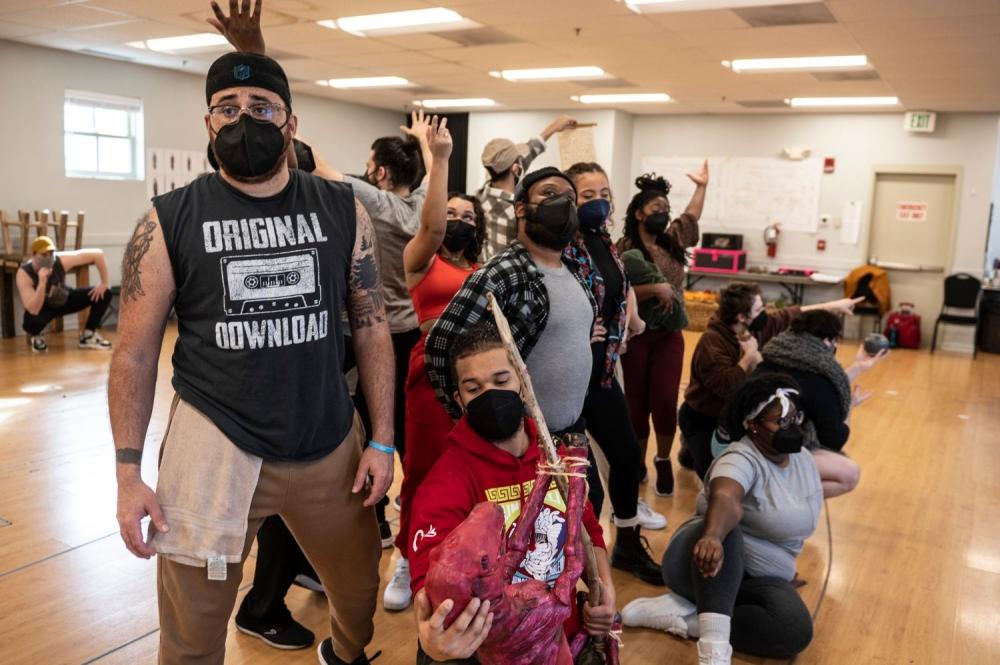
AK: You’ve been working with the creators of A.D. 16 for a number of years. Can you share how you came into each other's orbit and how you got attached to the show?
SB: Yeah, so it started with my agent saying, there's a client of ours that's working on this musical, and Cinco was the client. So I started off by having a meeting with Cinco. I was completely delighted by the piece. Basically when I got it, there was sort of a shape to Act I and there were some demos and I think there was one Mary song that existed for Act II. It was very much a work in progress, which I selfishly love because it feels like just an earlier point for me to get into a project and to get into the conversations. And the kind of cherry on top of this was that Bekah wrote the book and I've known her for a long, long time. One of my first big directing gigs was directing Bekah's play Be A Good Little Widow in New York, like forever ago. It was a great reunion to work with Bekah again, and just the best introduction to Cinco who I've become completely obsessed with. Cinco and I did like a tiny little workshop in a very small room to hear Act I out loud. And it just became very clear that I loved the piece and fought desperately to kind of say, “I want to be attached to this.” So luckily, they've taken me along for the ride.
AK: This production of A.D. 16 at Olney Theatre Center will be the show’s world premiere. Audiences will be treated to the first production of this musical with all the bells and whistles. Can you talk a bit about the timeline from a musical’s conception to first full-production?
SB: Yeah. I mean, listen, it varies for every project, but it takes a lot of time. It takes a lot of time to write a musical and then it takes a lot of time to develop. Development opportunities are scarce for new musicals because frankly they're expensive to develop. So it can be really hard to say, “oh God, I have this amazing musical,” but I need opportunities for somebody to say, “hey, here's a week in our space and we'll give you actors and you can work on it.” That’s why we were so, so grateful when Jason Loewith and Olney provided that space for us. We had done that funny little workshop of Act I. Then, we did a concert in New York of the songs. And then we did a reading of Act I as a part of a festival in New York where Jason saw it. From there we went and we took it on a little retreat with Bekah and myself and we really spent a bulk of that retreat really starting to work on Act II. Jason invited us here to do a workshop, which is actually the first time that we heard the whole piece together. I think in that workshop is where Cinco wrote the end number of Act I. We also wrote a big trial piece in Act II here. So that workshop was really a high point in the development because it felt like we were able to bring in new material at a really rapid pace and get a sense of the whole show. We then did another workshop out in Austin, Texas and I think I did one other book reading and now we're here in rehearsals.
Don't quote me on the exact timeline of that, but it's at least five years, four or five years, I think, which feels pretty normal if not expedited, but I think a lot of people are shocked to hear about how long the timeline is. Certainly some other musicals go very quickly, and some take much, much longer, but it is really an investment of time.
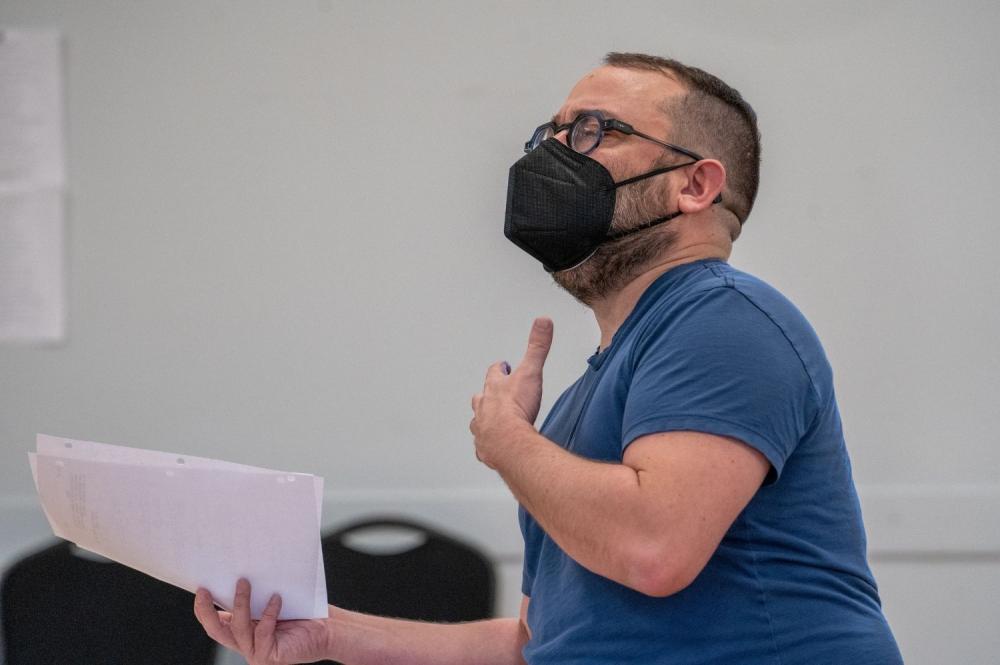 Image credit
Image credit
"For many different reasons, the world can feel really oppressive right now. To be working on a piece that has a really simple, soft prompt about thinking outside of yourself, learning to respect the differences in others, and figuring out how to love in a way that is selfless… that feels to me something that yes, is a Christian message, but is also something that is just human."
AK: The humor in A.D. 16 is one of it’s most compelling elements. Bekah Bunstetter’s book is charming and referential in a way that everyone can relate to and Cinco Paul’s R&B and Hip-Hop score is a joyful surprise. How does the humor in the piece speak to you as a director?
SB: Well, I'm a sucker for comedy in general, but more than that, I'm a sucker for comedy that has something to say. Comedy that delves into the humanity of drama. So, I loved that this piece had both of those elements to it. I think that the spark of the show for me was a show set in 16 A.D. with 90s R&B reference tunes in it. That sentence tells you all that you need to know about this show there. And so that was sort of Cinco’s go-point. And then the genius was bringing on Bekah, who has such an understanding of modern cadence, and such an amazing understanding of a female perspective and a female perspective on spirituality specifically. It’s that combination of these like amazing bops, these tunes that Cinco wrote that had that sense of modernity, that then is sort of pushed even farther by Bekah's understanding of the cadence of modern language and hilarious jokes about a girl falling in love with Jesus. Their sense of humor plays off of each other in a really great way. Cinco, I think, has an amazing sense of how to structure a great joke and how to build up to a punchline. He’s just flawless at it. And then Bekah kind of comes in with this more anxious, modern sense of humor. There is something about the way that they fill in each other’s gaps and play off of each other that just feels delicious to me. Whenever I talk about this piece, I talk about the chemistry of Bekah's language and Cinco’s lyrics and music.
AK: I mean, knowing both of their entire catalogues of work, it really is a match made in heaven.
SB: Yeah, and I chalk that up to Cinco. Cinco knew. I mean, Cinco, I think I actually read, Be A Good Little Widow, that play that I directed of Bekah’s. That was one of the things that he read and said, yeah, Bekah's the writer for this. Cinco knew. He knew
AK: Tagline: Cinco knew! [laughs] One more question: So you mentioned on the first day of rehearsal that your approach to directing A.D. 16 is joyfully agnostic. Can you speak a little bit more to the themes of spirituality in the show that you feel transcend any one particular religion?
SB: Yeah so I grew up congregational Protestant, which was a really beautiful way to grow up that had a really kind of soft approach to spirituality ingrained in it, which I really cherished as a kid. As an adult man, that sense of spiritual life has not been something that has held on in my life, but one of the things that this project has done is made me remember how many beautiful ideas are in the Bible. There’s a lot of really gorgeous ideas in the Bible. This play goes into these simple examinations of those tenants, but ultimately for me, this play is about how to treat other people and how to understand a sense of love that transcends yourself and becomes about other people. We tell a very specific story of a girl learning that, but I feel like that message ripples through with this sense of generosity at the end of the piece that I hope an audience can feel and take out into the world. I hope people can take it into their lives in some way. It is again, a time right now that can be really crushing. For many different reasons, the world can feel really oppressive right now. To be working on a piece that has a really simple, soft prompt about thinking outside of yourself, learning to respect the differences in others, and figuring out how to love in a way that is selfless… that feels to me something that yes, is a Christian message, but is also something that is just human. That message speaks to a generosity of humanity that I believe in and so, that's why I get excited about this piece. I feel like people who have a base in Christianity will see their beliefs reflected on stage with a sense of humor, but also a sense of respect. And people who come in with different senses of spirituality or selves can come in and just also see how beautiful it can be to have that generosity when you're approaching other people.
AK: That's beautiful. Thank you so much, Stephen.
